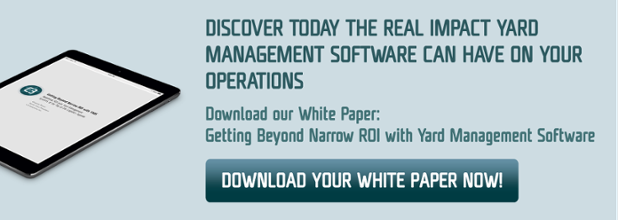Economic Benefits of a Yard Management Software Application

Many large and sophisticated companies continue to use spreadsheets, chalkboards, or card systems to manage their yard operation. This simplistic approach may work some of the time, but the reality is that it only takes one or two human errors per week to result in significant cost issues.
Problems relating to manual yard management can quickly result in misplaced trailers that contain valuable merchandise needed to fulfill customer/store orders. The cost penalty of sending a yard driver into the yard to search for a lost trailer is relatively minor. The real penalty is the negative impact on sales revenue when critical inventory is lost in the yard prior to a major promotional or seasonal event.
When developing the return on investment for advanced yard management software, it is important to understand the direct and indirect costs that may apply to your logistics operation.
Direct Benefits
Direct benefits are measurable operating savings that relate directly to the yard operation including yard driver labor, fleet equipment costs, and accessorial charges.
The cost of yard drivers including labor, fuel, maintenance, and equipment costs.
For many firms, these expenses are embedded within the overall transportation budget so it is important to develop the operating expenses associated specifically to the yard operation.
-
Companies that have deployed advanced YMS applications typically gain efficiency with shunting (yard jockey) labor in the range of 25% - 35% because the software eliminates all manual searching processes in addition to maximizing yard driver efficiency by minimizing empty bob-tail miles.
-
Yard operations with advanced YMS typically enjoy a minimum increase of 2 - 3 more trailer moves per worked hour as a good "rule of thumb".
-
Yard operations with advanced YMS also spend far fewer hours performing yard checks which provide a means of verifying data integrity in the yard operation. These are similar to cycle counts in a WMS operation. The need to perform yard checks is significantly reduced because the YMS has robust trailer tracking capabilities.
-
These efficiency gains typically translate into reduced labor requirements and less yard jockey truck requirements.
Improvements in trailer utilization rates because of the significant improvement in how trucking assets are managed in the yard.
-
The standard time required for trailers to pass through a main security gate is typically in the range of 5 - 10 minutes. This time can be reduced to 30 seconds (or less if green-lined) if the YMS manages all site check-in procedures while the load is in transit towards the site.
-
The ability to provide advance appointments to drivers combined with the optimized management of trailers within the yard typically results in a 10% - 15% reduction in the number of trailers required to support a large logistics operation. This can either translate into a reduced trailer leasing expense or a reduced capital investment into transportation infrastructure.
-
Reduced operator errors that result in moving the wrong trailer due to the replacement of paper instructions and radio communication devices.
The avoidance of third party carrier accessorial charges including detention/demurrage fees, redelivery fees and non-usage fees.
-
It may be overly optimistic to assume that a YMS can completely eliminate third party carrier accessorial charges, but a robust YMS application will certainly go a long way to avoiding many of these expenses.
-
The ability to turn third party trailer assets to avoid accessorial charges can vary depending on whether or not this is a cost penalty being incurred in the first place. Companies that deploy advanced Yard Management Software applications typically avoid this expense by having the system closely monitor when third party assets need to be liberated based on dwell time limitations. An advanced YMS application also enables third party carriers and/or customers to see on-line equipment status rather than having to call in for status updates.
-
Dock scheduling software enables trailers to be assigned to the right door the first time, thereby avoiding having to move the trailer to another door due to human error. Some carriers charge a redelivery fee when this situation occurs and a robust YMS application can help to avoid this excess charge.
-
A robust Yard Management Software application will have algorithms to determine rules to govern how trailers are rotated in the yard for shipment loading purposes. For example, the oldest trailers in the yard may be allocated to shipping doors as a first priority to avoid non-usage fees
Indirect Benefits
Indirect benefits are subjective savings incurred due to yard operation improvements that are relatively difficult to measure: Reduced warehouse wait times, warehouse labor inefficiency, reduced order fill rates, reduced product spoilage, etc.
Improvements in order fill rates
The improvements can be realized when trailers are expedited for receiving on the basis of assigning the highest priorities to loads containing inventory that is in high demand.
-
For most firms, it is a difficult to place a dollar amount to this benefit because the metrics needed to measure the "size of the prize" are typically not tracked.
-
For example, if during the next operating shift fifty trailers will be received, are all fifty trailers equal in priority? What if some incoming trailers contain goods that are critical to keeping a production line running without disruption? What if some incoming trailers contain promotional inventory that needs to be expedited for receipt before the next order wave release? If the purchasing department has greater visibility of inventory held in the yard and also in transit towards the site, would there be an improvement in sales order fill rates? By extension, would there be an increase in sales revenue if buyers have greater control over how the receiving of incoming loads is prioritized?
-
The answers to these questions are different for every logistics operation based on dock constraints and the volume of inbound trucking activity. Suffice to say that many small and medium sized firms are now investing in YMS primarily to achieve these inventory-related benefits. For these companies, YMS is an integral software component needed to manage operations outside of the WMS and the TMS.
Reduced inventory losses.
-
For example, refrigerated trailers containing perishables inventory that spoils in the yard can be avoided if YMS agents notify the control center that the refrigerated unit is low on fuel or that the temperature inside the trailer is too high.
-
Trailers held in the yard with dated inventory can be prioritized on the basis of product expiration dates to prevent newer stock from being transferred before older stock.
Improvements in warehouse efficiency are common with companies that deploy advanced YMS applications.
-
For large retail/distribution centers, the general assumption is that trailers are being brought to the dock doors on time so that the warehouse is able to load and ship trailers in a timely manner.
-
Warehouse loading delays, caused by trailers not being brought to the doors on time, can result in shipping dock congestion and inefficient outbound labor productivity. If loaders are waiting on the dock for trucks to pull up then any idle time comes at a cost. If operators in the warehouse have to travel further because dock staging/marshaling lanes are backed up due to dock congestion, this extra travel time comes at a cost.
-
During peak operations, these inefficiencies are typically more apparent because the consequences of dock congestion become more pronounced as shipping volumes increase.
-
Companies that deploy advanced YMS solutions are reporting increases in warehouse throughput efficiency in the order of 10% - 12% for outbound operations during peak season. This benefit is directly tied to YMS because the application works to avoid delays incurred due to trailers not being brought to the shipping doors on time.
Lastly on this topic, a trailer that is late in departing the distribution facility is also likely to be a trailer that is late in arriving at a retail store. The retail stores hire labor resources to unload trailers based on set delivery schedules. These labor resources may incur inefficiencies or overtime expenses as a direct result of late incoming trailer loads as a by-product of an inefficient yard operation.
To better understand how yard management can benefit your business, we recommend you download our white paper 'Getting Beyond Narrow ROI with Yard Management Software'.

